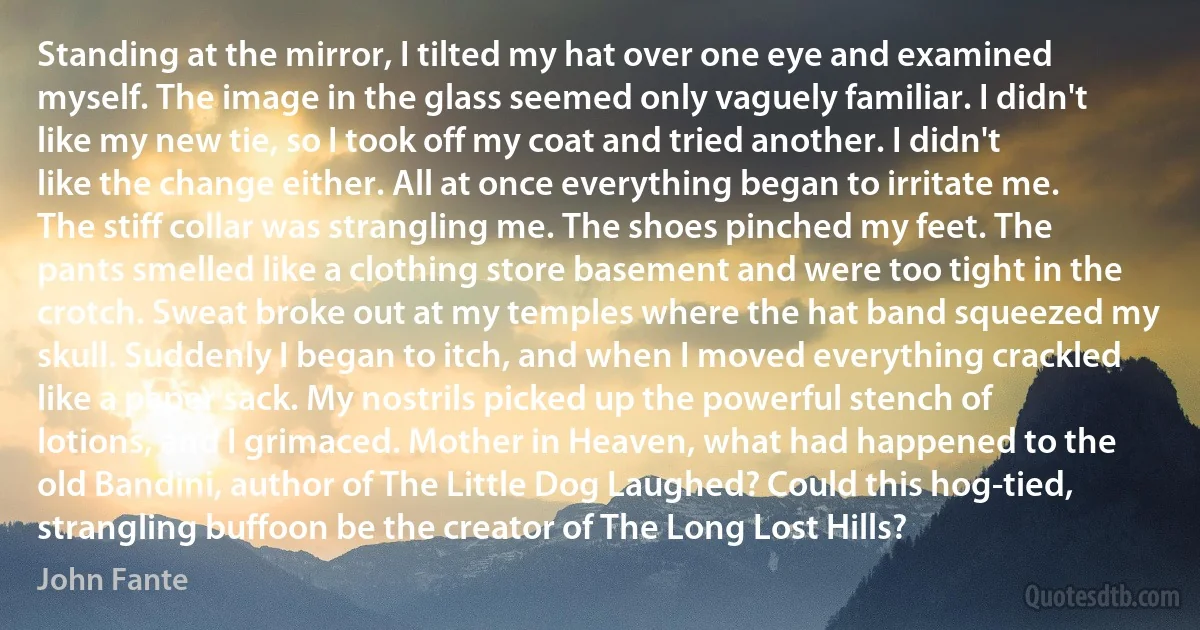
Standing at the mirror, I tilted my hat over one eye and examined myself. The image in the glass seemed only vaguely familiar. I didn't like my new tie, so I took off my coat and tried another. I didn't like the change either. All at once everything began to irritate me. The stiff collar was strangling me. The shoes pinched my feet. The pants smelled like a clothing store basement and were too tight in the crotch. Sweat broke out at my temples where the hat band squeezed my skull. Suddenly I began to itch, and when I moved everything crackled like a paper sack. My nostrils picked up the powerful stench of lotions, and I grimaced. Mother in Heaven, what had happened to the old Bandini, author of The Little Dog Laughed? Could this hog-tied, strangling buffoon be the creator of The Long Lost Hills?
John FanteRelated topics
basement begin broke change clothing coat dog everything eye feet glass hat heaven itch lost mirror mother off once paper sack shoes skull standing store strangling sweat take tie tryRelated quotes
That's how we've always moved this country forward, by all of us coming together on behalf of our children, folks who volunteer to coach that team, to teach that Sunday school class, because they know it takes a village. Heroes of every color and creed who wear the uniform and risk their lives to keep passing down those blessings of liberty, police officers and the protesters in Dallas who all desperately want to keep our children safe. People who lined up in Orlando to donate blood because it could have been their son, their daughter in that club. Leaders like Tim Kaine who show our kids what decency and devotion look like. Leaders like Hillary Clinton who has the guts and the grace to keep coming back and putting those cracks in that highest and hardest glass ceiling until she finally breaks through, lifting all of us along with her.

Michelle Obama
What I really want to do, it seems, is to paint a single form in the middle of a canvas... That's all a painter is, an image maker, is he not? And one would be a fool, some kind of fool, to want to paint a picture. The most powerful instinct is to paint a single form in its continuity, which is after all what a face is. This happens constantly on a picture. I remember last year I became so nervous about what I was doing that I finally reduce it down to the can on the palette with brushes in it. Well, that's real, tat can with brushes. And I painted the an with brushes sticking in it, and I couldn't tolerate it. I couldn't face it. It was as if it didn't contain enough of my thoughts or feelings about it.... I became signs. Exactly.... It seemed to become signs and symbols and I don't like signs.

Phillip Guston
And when all things were created as has been described by Moses - both heaven and earth, and the things therein - the twelve angels of the Mother were divided into four principles, and each fourth part of them is called a river - Phison, and Gehon, and Tigris, and Euphrates, as, he says, Moses states. These twelve angels being mutually connected, go about into four parts, and manage the world, holding from Edem a sort of viceregal authority over the world. But they do not always continue in the same places, but move around as if in a circular dance, changing place after place, and at set times and intervals retiring to the localities subject to themselves. And when Phison holds sway over places, famine, distress, and affliction prevail in that part of the earth, for the battalion of these angels is niggardly.

Hippolytus of Rome
Justice is the end of government. It is the end of civil society. It ever has been, and ever will be, pursued, until it be obtained, or until liberty be lost in the pursuit. In a society, under the forms of which the stronger faction can readily unite and oppress the weaker, anarchy may as truly be said to reign, as in a state of nature where the weaker individual is not secured against the violence of the stronger: And as in the latter state even the stronger individuals are prompted by the uncertainty of their condition, to submit to a government which may protect the weak, as well as themselves: so in the former state, will the more powerful factions be gradually induced by a like motive, to wish for a government which will protect all parties, the weaker as well as the more powerful.

Alexander Hamilton
Allah, who is the only true God and has no other emanation, endowed the king of Islam with the strength to destroy this ancient shrine on the eastern sea-coast and to plunge it into the sea, and after its destruction, he ordered the nose of the image of Jagannath to be perforated and disgraced it by casting it down on the ground. They dug out other idols, which were worshipped by the polytheists in the kingdom of Jajnagar, and overthrew them as they did the image of Jagannath, for being laid in front of the mosques along the path of the Sunnis and way of the musallis (the multitude who offer prayers) and stretched them in front of the portals of every mosque, so that the body and sides of the images may be trampled at the time of ascent and descent, entrance and exit, by the shoes on the feet of the Muslims.

Firuz Shah Tughlaq
